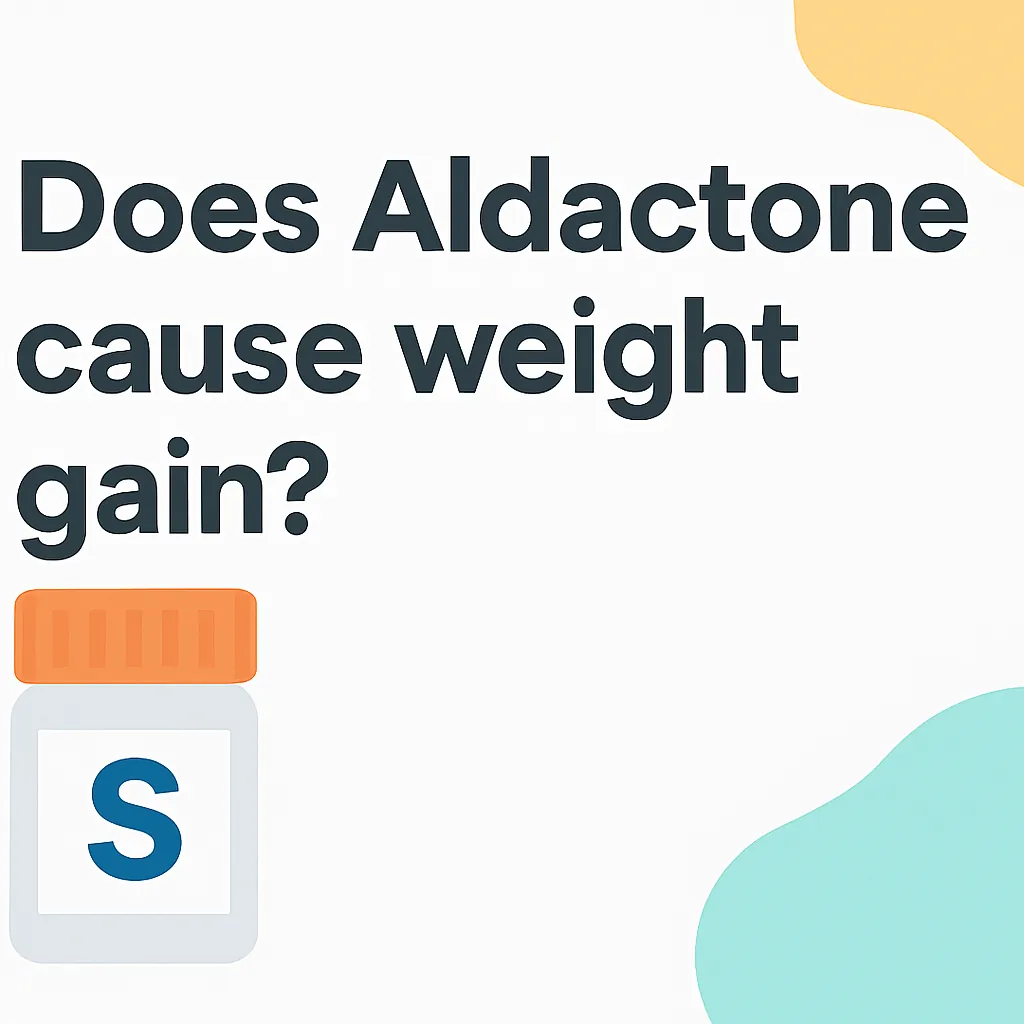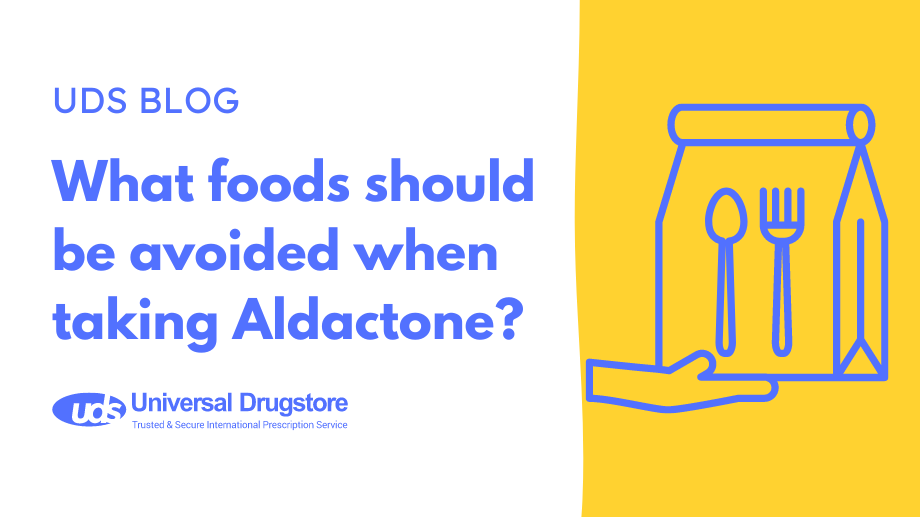Does Aldactone cause weight gain?

Aldactone (spironolactone) is a brand-name oral potassium-sparing diuretic (water pill) that is used for swelling and certain heart conditions. It reduces the sodium and water your body that builds up during fluid retention and increases your potassium levels, which can be beneficial for your long-term heart health.
As with all medications, Alactone can cause side effects. Is weight gain one of these potential side effects? During clinical trials, people who took Aldactone did not report an increase in body weight. It is unlikely to be associated with weight gain when being used to treat heart conditions because it works to remove excess fluid in your body. If you are retaining fluid, you may actually experience some degree of weight loss. It is important to note that this will more than likely be a loss of water weight and not the same as healthy weight loss due to a decrease in body fat or body mass.
If you notice a sudden or unexpected weight gain after starting Aldactone, notify your healthcare provider. They can determine what caused you to gain weight and let you know if you need more medical attention.
Read on to learn more about Aladactone, including what it is used for, possible side effects, drug interactions, and other frequently asked questions.
Aldactone FAQs
What is Aldactone used for?
Your healthcare provider may prescribe Aldactone to treat conditions, such as:
- High blood pressure (hypertension)
- Congestive heart failure
- Primary hyperaldosteronism
- Edema due to liver disease, cirrhosis, or certain kidney problems
Aldactone also has off-label uses that are not approved by the United States Food and Drug Administration (FDA). Off-label uses are often prescribed by healthcare professionals when other treatment options do not work or if you have side effects from these other medications that are bothersome.
Off-label uses for Aldactone include the treatment of several medical conditions, including:
- Polycystic ovary syndrome (PCOS)
- Hair loss in women
- Hirsutism (excessive hair growth in women)
- Acne in women
- Treat or prevent hypokalemia (low potassium levels in your blood)
What is Aldactone’s mechanism of action?
Spironolactone (Aldactone) is a potassium-sparing diuretic that is also an aldosterone receptor antagonist. It blocks aldosterone (a hormone), so your kidneys can remove extra sodium and water. This lowers the amount of fluid in your blood vessels and other parts of your body. It makes you urinate more without lowering the amount of potassium in your body, unlike other types of diuretics.
In addition to its diuretic effects, Aldactone also blocks androgens produced by the ovaries and adrenal glands, which causes hair loss and hormonal imbalances.
What are the side effects of Aldactone?
Some less serious and common side effects of spironolactone include:
- Dizziness
- Headache
- Drowsiness
- Nausea
- Hair loss (alopecia)
- Diarrhea
- Vomiting
- Enlargement of male breasts (gynecomastia)
- Stomach cramps
- Lower sex drive
- Breast pain
- Irregular periods
- Sexual dysfunction
- Higher potassium levels
- Leg cramps
- Lower sodium levels
Some people can experience serious side effects while using Aldactone that may require immediate medical attention. If you experience any of the following, contact your healthcare provider or seek assistance at your nearest hospital:
Shop Medications
- High potassium levels in your blood (hyperkalemia). Symptoms could include muscle weakness, a tingling sensation, numbness, trouble catching your breath, racing heart, nausea, chest pain, and vomiting.
- Other electrolyte imbalances, including low sodium, calcium, and magnesium in your blood. Symptoms could include fainting, muscle cramps, seizures, and irregular heartbeats.
- Dehydration and kidney problems. Symptoms could include muscle cramps, not urinating as much as usual, nausea, tiredness, vomiting, and swelling.
- Serious allergic reactions. Symptoms could include skin rash, hives, and swelling of the face, lips, and tongue.
These are not all of the possible side effects of Aldactone. You should always seek medical advice from your healthcare provider for any questions or concerns about your medical condition or treatment. Read all patient information, medication guides, or drug information sheets that come with this medication. You can also report adverse effects to the Food and Drug Administration at www.fda.gov/medwatch or 1-800-FDA-1088.
Does Aldactone increase estrogen?
Although there is not much evidence, Aldactone may also have mild estrogen-like effects. This causes a hormonal imbalance, which leads to menstrual irregularities in women, and breast enlargement in males.
Can you lose weight on Aldactone?
If you are taking Aldactone for edema, you may lose some weight as you remove the extra fluid in your urine. If you see a significant weight loss after starting Aldactone, this can be a sign you are losing too much fluid and are becoming dehydrated. Notify your healthcare provider if this occurs. You should not take Aldactone to lose weight. Only take it for the reason your healthcare provider has prescribed it for you.
Does Aldactone cause hair loss?
Hair loss is one of the side effects seen in clinical studies involving Aldactone. However, it is not known if the hair loss was caused by this medication or something else or how severe the hair loss was. Aldactone is sometimes prescribed off-label to limit hair growth in females with more severe cases of hirsutism (too much facial and body hair growth). This is a condition caused by higher testosterone levels. Because Aldactone lowers testosterone levels, it can decrease hair growth. If you have any questions or concerns about Aldactone and hair loss, talk with your healthcare provider.
What foods should you avoid while taking Aldactone?
You should avoid low-sodium salt and salt substitutes because they contain potassium. Using these with Aldactone can make your potassium levels too high.
You should also try to limit other foods, drinks, or supplements that contain high levels of potassium. Some foods high in potassium include including bananas, avocados, pulses, nuts, and salmon. Your healthcare provider or dietitian can develop a low-potassium diet that is right for you.
What will happen if you take too much Aldactone?
Taking more than your prescribed dose of Aldactone can lead to serious side effects, including overdose. Some symptoms of an overdose can include:
- Confusion
- Dizziness
- Drowsiness
- Diarrhea
- Nausea and vomiting
- Rash
Although rare, an overdose could lead to severe side effects in people with severe liver disease, including low sodium levels, high potassium levels, and coma. There is no antidote for an Aldactone overdose. If you think you have taken too much of this medication, call your healthcare provider or a Poison Control Center at 800-222-1222 or use its online tool. If you are having severe symptoms, call 911 or go to the nearest emergency room immediately.
Related Medications
- Lasix (furosemide)
- Hydrodiuril (hydrochlorothiazide)
- Inspra (eplerenone)
- Midamor (amiloride)
- Maxzide (triamterene/HCTZ)
- Bumex (bumetanide)
Sources
- Aldactone (spironolactone) tablets for oral use. (2022). United States Food and Drug Administration. Accessed June 12, 2024.
- Spironolactone. DailyMed. Accessed June 12, 2024.
- Spironolactone. StatPearls. Accessed June 12, 2024.





